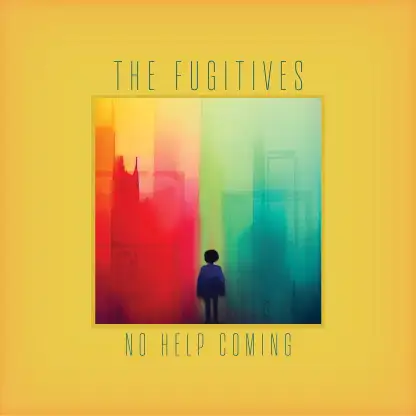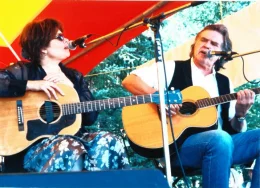
The Fugitives No Help Coming Fallen Tree Records Fugitives.ca
One of western Canada’s more prominent roots/folk ensembles, The Fugitives return with No Help Coming, a new album that brings them to my hometown of Leduc, Alberta November 8.
Previously, their excellent Trench Songs was nominated for a JUNO Award as Best Traditional Roots Album, and they have been nominated for multiple awards at the Canadian Folk and Western Canadian Music Awards. The long-running, Vancouver-based group is fronted by Adrian Glynn (vox, guitars, bass, balalaika, piano, and percussion) and Brendan McLeod (vox, guitars, ukulele, and banjo) with former Coal Porter Carly Frey (she played on two of the roots-bluegrass band’s finest albums, including Find the One) contributing vocals and violin with Chris Suen providing banjo and ukulele.
Instrumentally, the band is tight and focused, providing listeners with a repertoire of sounds impressive and engaging. Their vocals, both lead and harmony, are exceptionally presented. This level of competence continues throughout the new recording, one only marginally less-heavy thematically than Trench Songs, which was focused around lyrics written by World War I soldiers.
No Help Coming is a concept album about climate change. While Trench Songs was acoustic and rather sparse in sound, this time out the band has elected for a full-band, Americana approach, with greater emphasis on layered instrumental arrangements maintaining strong vocal harmonies. This modern-folk approach provides listeners with a robust set of songs vaguely reminiscent of what Great Big Sea once offered, although less rambunctious; Fleet Foxes, Shred Kelly, and long-ago Avett Brothers also come to mind.
Against a backdrop of self-inflicted global human destruction, The Fugitives have created an album of love songs (including “It Just Might Rain Like This For Days” and “Wing and a Prayer”) and those reflecting personal challenges (“Dead Money,” “No Help Coming,” and the stunning “Not Burning Out”) each of which come from the perspective that our world is on the brink, and we’ve fritted away time that might have made a difference.
The songs are not doom and gloom; in fact, one could easily listen to and thoroughly enjoy the album without attending to the included allusions and references. The songs sound positive and lively, but are shadowed by a depth of significance when one chooses to listen acutely to the poetically abstract lyrics.
Along with “Story of our Times” (“When every farm is dust and waterfalls are frozen, blink twice with your light, I’ll be in the mountains…”) the album’s strongest songs may be “Ash” and “After You’re Gone,” two numbers that lyrically depict our future in the grimmest of terms.
With Frey and Suen contributing as half the group, The Fugitives have a very different sound than many modern folk groups. This ‘grounded in tradition’ approach well-serves the quartet.
No Help Coming is a welcome addition to 2023, certain to appear on my ‘favourite roots albums of the year’ list when the time comes.
For their Leduc appearance November 8 at the MacLab Theatre, part of a cross-county tour, The Fugitives present “Ridge” which is the live-culmination of Trench Songs with the addition of a celebration of No Help Coming’s release. It should be a rare and absolutely incredible evening of music. (The Fugitives also have gigs in Spruce Grove, Camrose, St. Albert, and Fort Saskatchewan as they spend most of a week in the capital-city area.)
